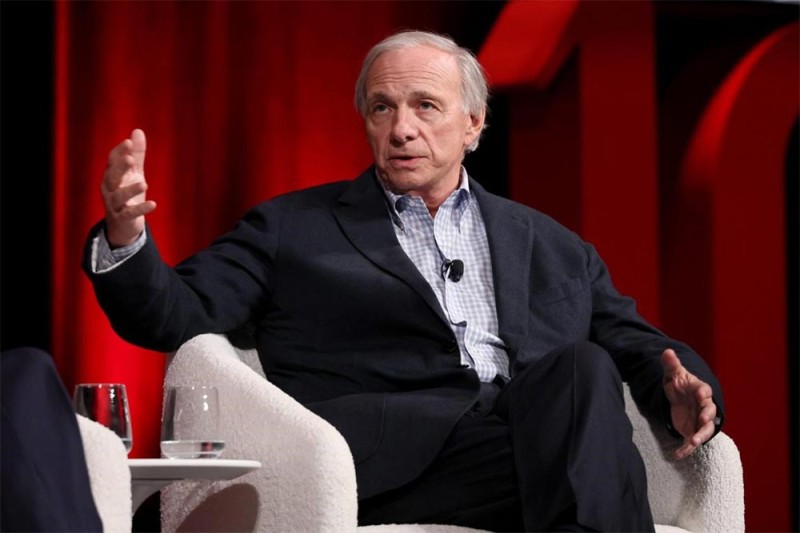
传奇投资人、亿万富翁雷・达利奥近日指出,美国和英国这两个老牌大国的未来都不乐观,他对美英两国的发展轨迹都不看好,他还说“我们正在步入非常非常黑暗的时期”。达利奥是全球最大的对冲基金桥水公司的创始人。通过他对500年来的历史的研究,他认为,我们目前正处于一个80年的历史周期中,可能马上会迎来一个全球冲突和国内冲突全面加剧的历史阶段。
达利奥认为,有五大主要力量推动了历史的循环:货币和债务力量、国内冲突、地缘政治冲突、自然行为以及人类的发明创造——尤其是科学技术的进步。他指出,美英两国都表现出了一些症状,说明两国已经逼近了大国历史时期的一个危险阶段。
达利奥在现身“CEO日记”播客时表示:“英国存在金融问题,英国政府也存在债务问题。”但债务相对于收入增加时,就会挤压经济。这种金融压力与第二大力量有关,也就是激烈的国内冲突。由于社会存在着巨大的贫富差距和机会差距,导致社会左右两派出现了深刻的分裂,从而导致人们对体制失去信任。达利奥认为,英国缺乏美国那样的创新文化,也缺乏强大的资本市场,这进一步阻碍了英国的发展前景。
达利奥的看法可能有一些争议性。但不可否认的是,在过去20年间,英国的生产力确实并没有什么提升。2022年,剑桥大学公共政策教授黛安・科伊尔在接受NPR的《行星货币》采访时也谈到了这一点。“从00年代中期以来,英国的生产力就一直停滞不前,与其他国家相比,虽然其他国家的发展速度也有所放缓,但我们的放缓程度比那些国家都严重得多。”伦敦经济学院今年早些时候也就这个问题开展了研究,并称之为“生产力之谜”。他们的结论是,与美国、德国和法国相比,英国在全球金融危机之后劳动力生产率的下降最为严重。
美国面临的问题
达利奥对美国同样持悲观看法。尽管他认可美国的创业和创新文化,但他也指出,美国在方方面面都面临着严峻挑战。首先,美国存在严重的债务问题,其内部政治格局也因贫富差距和价值观分歧而呈现出危险的极端化倾向,这甚至威胁到了美式民主本身。此外,美国还面临与中国的“大国冲突”,中美两国的科技战打成什么样,将决定未来的世界秩序。“科技战的赢家将赢得所有战争。”他还提到了核武器等历史上的例子。
在达利奥发表这番看法时,中美正在就TikTok的最终归属问题进行谈判。这也突显了科技在这场大国角力中的重要性。
尽管英美两国的发展前景堪忧,但达利奥认为,这两个老牌大国的老百姓应该做的不是感到决望,而是个人要做好准备。他认为,问题的关键是“你作为个人应该如何应对”。针对未来的不确定性时期,他也对普通人提供了清晰的、具有可操作性的建议。
首先,他强调了灵活性和流动性的重要性,并引用了中国的一句谚语——“狡兔三窟”。换句话说,你要有在坏事发生时将你自己和你的资本灵活抽身的能力。达利奥认为,在一个快速变化的世界里,一旦被房产等资产束缚,就会限制你的这种至关重要的灵活性。
在财务上,普通人应该量入为出,辅以明智的投资。在个人层面,达利奥建议大家了解自己的“本性”,并找到一条与之相符的人生道路。对于处于职业生涯早期阶段的人,首要任务应该是找到一个好的导师并向他学习,而不是盲目追逐最高薪的工作。他还认为,最充实的生活来自有意义的工作和人际关系,这些事带来的幸福感,要超过单纯的赚钱。
达利奥最重要的一条建议是关于个人成长的。他说:“进步=痛苦+反思”。他还说,他相信“最好的学习来自痛苦”,因为你必须了解现实的世界是怎样运作的,并且学会如何应对现实,并且制定更好地应对现实的处世原则。“我学到了这个过程,而且通过这个过程,我的桥水公司成了世界上最大的对冲基金。”在这个过程中,他也成了“一个非常有钱的人,但是这并不是我的本意,我只是想玩好这场游戏,做有意义的工作,拥有有意义的人际关系,这才是最重要的。只是碰巧这个游戏让我变得非常富有罢了。”
《财富》使用AI完成本文初稿,发稿前由编辑核实了信息的真实性。(*)
译者:朴成奎
传奇投资人、亿万富翁雷・达利奥近日指出,美国和英国这两个老牌大国的未来都不乐观,他对美英两国的发展轨迹都不看好,他还说“我们正在步入非常非常黑暗的时期”。达利奥是全球最大的对冲基金桥水公司的创始人。通过他对500年来的历史的研究,他认为,我们目前正处于一个80年的历史周期中,可能马上会迎来一个全球冲突和国内冲突全面加剧的历史阶段。
达利奥认为,有五大主要力量推动了历史的循环:货币和债务力量、国内冲突、地缘政治冲突、自然行为以及人类的发明创造——尤其是科学技术的进步。他指出,美英两国都表现出了一些症状,说明两国已经逼近了大国历史时期的一个危险阶段。
达利奥在现身“CEO日记”播客时表示:“英国存在金融问题,英国政府也存在债务问题。”但债务相对于收入增加时,就会挤压经济。这种金融压力与第二大力量有关,也就是激烈的国内冲突。由于社会存在着巨大的贫富差距和机会差距,导致社会左右两派出现了深刻的分裂,从而导致人们对体制失去信任。达利奥认为,英国缺乏美国那样的创新文化,也缺乏强大的资本市场,这进一步阻碍了英国的发展前景。
达利奥的看法可能有一些争议性。但不可否认的是,在过去20年间,英国的生产力确实并没有什么提升。2022年,剑桥大学公共政策教授黛安・科伊尔在接受NPR的《行星货币》采访时也谈到了这一点。“从00年代中期以来,英国的生产力就一直停滞不前,与其他国家相比,虽然其他国家的发展速度也有所放缓,但我们的放缓程度比那些国家都严重得多。”伦敦经济学院今年早些时候也就这个问题开展了研究,并称之为“生产力之谜”。他们的结论是,与美国、德国和法国相比,英国在全球金融危机之后劳动力生产率的下降最为严重。
美国面临的问题
达利奥对美国同样持悲观看法。尽管他认可美国的创业和创新文化,但他也指出,美国在方方面面都面临着严峻挑战。首先,美国存在严重的债务问题,其内部政治格局也因贫富差距和价值观分歧而呈现出危险的极端化倾向,这甚至威胁到了美式民主本身。此外,美国还面临与中国的“大国冲突”,中美两国的科技战打成什么样,将决定未来的世界秩序。“科技战的赢家将赢得所有战争。”他还提到了核武器等历史上的例子。
在达利奥发表这番看法时,中美正在就TikTok的最终归属问题进行谈判。这也突显了科技在这场大国角力中的重要性。
尽管英美两国的发展前景堪忧,但达利奥认为,这两个老牌大国的老百姓应该做的不是感到决望,而是个人要做好准备。他认为,问题的关键是“你作为个人应该如何应对”。针对未来的不确定性时期,他也对普通人提供了清晰的、具有可操作性的建议。
首先,他强调了灵活性和流动性的重要性,并引用了中国的一句谚语——“狡兔三窟”。换句话说,你要有在坏事发生时将你自己和你的资本灵活抽身的能力。达利奥认为,在一个快速变化的世界里,一旦被房产等资产束缚,就会限制你的这种至关重要的灵活性。
在财务上,普通人应该量入为出,辅以明智的投资。在个人层面,达利奥建议大家了解自己的“本性”,并找到一条与之相符的人生道路。对于处于职业生涯早期阶段的人,首要任务应该是找到一个好的导师并向他学习,而不是盲目追逐最高薪的工作。他还认为,最充实的生活来自有意义的工作和人际关系,这些事带来的幸福感,要超过单纯的赚钱。
达利奥最重要的一条建议是关于个人成长的。他说:“进步=痛苦+反思”。他还说,他相信“最好的学习来自痛苦”,因为你必须了解现实的世界是怎样运作的,并且学会如何应对现实,并且制定更好地应对现实的处世原则。“我学到了这个过程,而且通过这个过程,我的桥水公司成了世界上最大的对冲基金。”在这个过程中,他也成了“一个非常有钱的人,但是这并不是我的本意,我只是想玩好这场游戏,做有意义的工作,拥有有意义的人际关系,这才是最重要的。只是碰巧这个游戏让我变得非常富有罢了。”
《财富》使用AI完成本文初稿,发稿前由编辑核实了信息的真实性。(*)
译者:朴成奎
Legendary billionaire investor Ray Dalio has issued a stark warning about the future of the United States and the United Kingdom, stating he is not optimistic about either nation’s trajectory and believes “we’re heading into very, very dark times.” Drawing on his own proprietary study of 500 years of history, the founder of the world’s largest hedge fund, Bridgewater Associates, points to a predictable 80-year cycle that suggests an era of significant global and internal strife is upon us.
Dalio’s framework is built on five major forces that drive history in cycles: a money and debt force, internal conflict, geopolitical conflict, acts of nature, and human inventiveness, particularly technology. He argues that both the U.S. and the U.K. are exhibiting clear symptoms of a cycle nearing a dangerous phase.
“The U.K. has a financial problem, the government has a debt problem,” Dalio explained in an appearance on the “Diary of a CEO” podcast, noting that when debts rise relative to income, it squeezes the economy. This financial strain is connected to the second force: intense internal conflict. With large wealth and opportunity gaps, societies are experiencing deep divisions between the left and right, leading to a loss of trust in the system. Dalio believes the U.K. also lacks the culture of inventiveness and the robust capital markets seen in the U.S., further hindering its prospects.
While that’s arguable, what is not is that productivity in the U.K. has been remarkably flat for roughly 20 years. Diane Coyle, a professor of public policy at the University of Cambridge, talked to NPR’s Planet Money about it in 2022. “We’ve had flatlining productivity since the mid-2000s,” she said. “And while compared to other countries, they’ve had slowdowns, we’ve just had a much worse slowdown than anybody.” The London School of Economics revisited the subject earlier this year, calling it a “productivity puzzle” while concluding that the U.K. had “had the worst contraction in labour productivity after the financial crisis” compared to the U.S., Germany and France.
Problems ahead for America
However, Dalio was equally pessimistic about the United States. While acknowledging its culture of entrepreneurship and innovation, he pointed to severe challenges across the board. The U.S. has a significant debt problem, and its internal political landscape is dangerously polarized by wealth and values gaps, putting democracy itself at risk. Furthermore, he argued that it’s in a “great power conflict” with China and its allies, and the two countries are locked in a technology war that will determine the future world order. “The winner of the technology war is going to win all wars,” Dalio stated, referencing historical precedents like the development of nuclear weapons.
As Dalio was speaking, the U.S. and China—with several of the world’s richest men in the mix, including Rupert and Lachlan Murdoch, Larry Ellison and Michael Dell—were negotiating the final details of U.S. control of TikTok. Control over the algorithm was the final detail being negotiated in late September as Donald Trump and Xi Jinping held crunch talks, underscoring the crucial nature of technology in this great-power conflict.
Despite this grim outlook, Dalio’s message is not one of despair but of individual preparation. He insists the crucial question is not whether to be concerned, but “how you as an individual handle it.” He offers clear, actionable advice for navigating the uncertain times ahead.
First, he stresses the importance of flexibility and mobility, citing a Chinese saying: “a smart rabbit has three holes.” This means having the ability to move yourself and your capital away from bad situations and toward better ones—like a rabbit would choose one of its three habitats, depending on its problems in the wild. Dalio suggested that being anchored to an asset such as a house can limit this crucial flexibility in a fast-changing world.
Financially, individuals should focus on building strength through disciplined earning, spending, and saving, paired with smart investing. On a personal level, Dalio advises people to understand their own “nature” and find a path in life that aligns with it. For those early in their careers, he emphasizes that the priority should be learning from the best possible mentors, not chasing the highest-paying job. The most fulfilling life, he argues, comes from having meaningful work and meaningful relationships, which correlate more strongly with happiness than vast amounts of money.
Central to all of Dalio’s advice is his guiding principle for personal growth: “Pain plus reflection equals progress.” He said that he believes the “best learnings come from the pain,” because you have to pay attention to learn how reality works and deal with it, and develop principles for dealing with reality better. “I learned that process and from that process my company Bridgewater became the largest hedge fund in the world,” he said, adding that it it made him a “very wealthy man, which by the way was not my intention, okay? I just wanted to play the game and to have meaningful work and meaningful relationships, that was paramount,” but it just so happened that game made him very wealthy.
For this story, Fortune used generative AI to help with an initial draft. An editor verified the accuracy of the information before publishing.

